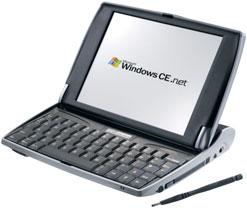Intel/Psion Strike Deal Over "Netbook"
Intel and Psion Teklogix have resolved the "netbook" naming issue, with the latter company dropping its lawsuit according to various reports.
Intel and Psion Teklogix have resolved the "netbook" naming issue, with the latter company dropping its lawsuit according to various reports. Previously, Psion contended the use of the term "Netbook," as it registered the name with the trademark office when it originally released its "Netbook Pro" handheld computer back in the 1990s. Although the company ceased the manufacturing of its Netbook Pro device in 2003, Psion claims that the Netbook Pro still brings in revenue, $13,650 in fact this past March.
However, in 2008, Intel began using the "netbook" term, labeling its Atom-charged, low-powered sub-notebooks with a label originally thought to be defunct. The name caught on in the industry, ruffling a few Psion feathers in the process. The company thus went after corporations who used the "netbook" term including Google, Intel, and Dell, sending out cease-and-desist orders. Intel, on the other hand, disagreed with Psion's stake in the "netbook" terminology, claiming that the Psion trademark was in fact invalid, and that the Netbook Pro isn't bringing revenue as Psion claims. Both Dell and Intel filed suit against Psion to have the trademark revoked; Psion filed a countersuit against Intel for "unauthorized" use of the "netbook" term while promoting its Atom processors and chipsets.
As of today, a spokesman for Intel told Register Hardware that the two companies have "worked out their differences" in an out-of-court agreement, but didn't elaborate on any details. The only official word stemming from the settlement (so far) came from Psion itself, saying that it will "voluntarily withdraw all of its trademark registrations for [the term] 'netbook'." The company also said that it agreed to waive all rights against third parties "in respect of past, current or future use of the 'netbook' term."
Get Tom's Hardware's best news and in-depth reviews, straight to your inbox.

Kevin Parrish has over a decade of experience as a writer, editor, and product tester. His work focused on computer hardware, networking equipment, smartphones, tablets, gaming consoles, and other internet-connected devices. His work has appeared in Tom's Hardware, Tom's Guide, Maximum PC, Digital Trends, Android Authority, How-To Geek, Lifewire, and others.
-
Grims Yeah, it's annoying Kevin is the only writer who does this. What ever you guys do it needs to be consistent through all articles.Reply
Back to the story, it looks like someone got a major settlement to change their tune so much. -
blackened144 So, Intel sued Psion and they dropped their lawsuits against all the other companies? That was awfully nice of Intel..Reply -
hellwig Seems like Psion might be getting a check from Banco Internacional de Intel.Reply
And yes, it would be in Intels interest to get Psion to drop their suit against all companies, as most "netbooks" run the Intel Atom, and Intel profits heavily from the netbook/Atom crossover. -
Vettedude Psion sounds like a punk company to me. Netbook is a generic term that explains the small laptops powered by Atom chips perfectly. Laptop designed for internet use. I have to agree with Intel here.Reply -
hellwig vettedudePsion sounds like a punk company to me. Netbook is a generic term that explains the small laptops powered by Atom chips perfectly. Laptop designed for internet use. I have to agree with Intel here.vettedude: read up on a little history (or at least read the article). Psion trademarked "Netbook" back in the 90's, long before anyone else was using it, and long before Intel created the Atom and started using the term to promote Atom. Just because a term BECAME popular, doesn't mean you can violate trademark. Trademarking an already popular term (like Dell trying to trademark could computing) is certainly bogus. Defending a trademark after it became popular is not.Reply -
tayb vettedudePsion sounds like a punk company to me. Netbook is a generic term that explains the small laptops powered by Atom chips perfectly. Laptop designed for internet use. I have to agree with Intel here.Reply
Hm. I do wonder where Intel got the idea to use the word "netbook." Could it have been from the trademarked name "netbook" Psion coined 6 years ago? Hmm... -
Vettedude hellwigvettedude: read up on a little history (or at least read the article). Psion trademarked "Netbook" back in the 90's, long before anyone else was using it, and long before Intel created the Atom and started using the term to promote Atom. Just because a term BECAME popular, doesn't mean you can violate trademark. Trademarking an already popular term (like Dell trying to trademark could computing) is certainly bogus. Defending a trademark after it became popular is not.Reply
I know. I did read the article. Psion does not sell the Netbook Pro anymore. It ceased in 2003. Atom came out in 2008. I realize for Intel to use the term may be unfair, but Netbook is now just a generic word like Ziplock bags.
